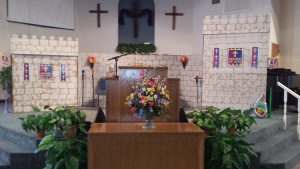1 Corinthians 8:6 But to us there is but one God, the Father, of whom are all things, and we in him; and one Lord Jesus Christ, by whom are all things, and we by him.
I love this verse. There are a lot of reasons why, but it succinctly defines God the Father, our Lord Jesus, and our relationship to each. Just to be clear, I’m not saying that the Father and our Lord are two distinct persons, but how we relate to each of these roles is different and they fulfill different purposes in our lives. Can I fully explain how this works? No! But neither can anyone else. This is one of those truths that we probably won’t understand until we step foot into heaven.
In his letter to the Corinthians, in the section in which this verse is found, Paul is discussing other so-called gods that the Corinthians believers had once worshipped and were continually being exposed to. He recognized there were lots of things that people worshipped as Gods, and there were lots of people they bowed to as lords, but he discounts them as nothing compared to the one true God and the one true Lord.
Look at what Paul says about our God – “there is but one God.” I’m reminded that all other gods worshipped by mankind have no interaction with them. People dedicate themselves and their possessions to those gods and get nothing in return, because there is nothing there that can give back. But our God is the one true God, we know Him and He knows us. He cares for us, loves us and wants to provide for us based on our relationship with Him. That’s why Paul calls Him Father. The relationship and the love God has for us are best reflected in the role of a father.
But He’s not just any father, He is the father that conceived and planned and initiated all of existence. Paul states it “of whom are all things.” Notice the word “of.” It means that everything that exists is because of God, our Father. We exist because of our Father. We are part of His plan – He has a purpose for us. If you don’t know Him, and have no relationship with Him, then you can never know and fulfill that purpose.
Understand, Paul is writing to believers. That’s why he can make the next statement, “and we in him.” This speaks of the believer’s relationship, purpose, and existence in God. The ultimate architect of the universe surrounds and permeates us as we exist in His will and according to His purposes. Think on that just a moment. Why are we timid to fulfill God’s purpose when we have that kind of power available to us?
Paul also told us of, “one Lord Jesus Christ.” There is a lot that can be said about that name. “Lord” is the one who is in control. The lord of the manner, the lord of the servant, is the one who has authority. It is by his will and direction that the servant takes action. When lord refers to our Savior, it reflects the relationship we have with Him. When we surrender ourselves to Him in exchange for His salvation, He becomes our Lord – the one to whom we should surrender our wills and our desires.
The title “Christ” designates Jesus as the Messiah, the Savior of the world. He is the one and only way to salvation for mankind. By using this title, Paul is both acknowledging Jesus as the Savior, but he is reminding believers of their relationship with Him.
Now, consider that next phrase: “by whom are all things.” This statement takes us back to creation. When God created the universe, Jesus was there. It was God’s plan and it was through God’s power that everything was created, but it was by the actions of Christ that creation occurred. I want you to consider the implications of what that means. Not only does it mean that the Trinity was active in the creation, it means that Christ was active in creating you. You were created by the Savior!!!
Is it any wonder that Jesus was willing to undertake the mission given to Him by the Father? Are you surprised that Jesus would give up the perfection of heaven to come to this earth and take on human flesh? Can you even imagine the kind of love it took for Jesus to submit to the ridicule and torture He would endure during His earthly life? He did it all because He loves His creation. The great news is, He still loves His creation, and that means He still loves you!!!
As believers, we exist, “by him.” Not only did He create us, but He redeemed us when we accepted His gift of salvation. When we were covered by the His precious blood, we became children of God. This could only happen through our relationship with Christ.
Two roles of the same God. Two ways of viewing our relationship with our God. This verse has a lot to say to us as believers. If you are not a believer so you don’t have this kind of relationship with God the Father – God the Creator, and God the Son – the Savior, I encourage you to seek Him out. You can learn more from the blog post What is Salvation? Found on this site. If you have any questions, please don’t hesitate to post a comment to this article or email me at pastor@bcpg.org.
With all God’s love and blessings,
Bro. E.C.

 Welcome to the castle. The picture above was taken as we were getting close to finishing our decorations for Vacation Bible School. We have a blast with a church full of kids for a week at the beginning of every summer. This year is shaping up to be just as much fun. In this post, I want to direct your attention to the two castle towers in the picture. On the left is a short tower, and on the right is a tall tower.
Welcome to the castle. The picture above was taken as we were getting close to finishing our decorations for Vacation Bible School. We have a blast with a church full of kids for a week at the beginning of every summer. This year is shaping up to be just as much fun. In this post, I want to direct your attention to the two castle towers in the picture. On the left is a short tower, and on the right is a tall tower.